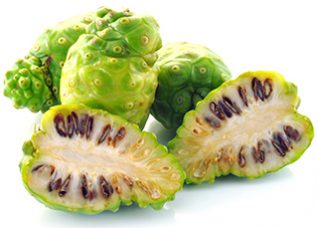
MinerAlert

MinerAlert
Morinda citrifolia
Morinda, Indian mulberry, Piña de puerco.

The leaves and, occasionally, the fruit and seeds. The juice is widely marketed as a cure for many ailments in the West, although evidence is scant or lacking with regard to its effectiveness.
Originally, the leaves were applied directly to the skin to treat ulcerations and minor infections. Multilevel marketing companies have proposed that drinking Noni juice can be used against a wide variety of ailments. Unfortunately, none of these claims have been substantiated by clinical evidence in humans. There is no evidence that the juice has been used medicinally to any extent by the Pacific Islanders or in Chinese traditional Medicine. Both the fruit and juice have a disagreeable “cheesy” taste and odor.
The leaves have also been used to treat gout, tuberculosis and ringworm. The seeds are eaten in order to expel intestinal worms in the Philippines. This plant has also been popular as a source of red, yellow and purple dyes. Most of the commercial Noni or Morinda juice available in the market today contains variable amounts of other fruit juices, due to the fact that Noni juice is considered to be unpalatable.
Safety/Precautions:
Before you decide to take any medicinal herb or herbal supplement, be sure to consult with your health care professional first. Avoid self-diagnosis and self-medication: Always be on the safe side!